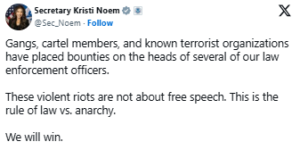Latino Gang Member Arrested in Alleged Conspiracy to Assassinate Border Patrol Chief
Chicago, IL — Federal authorities have arrested Juan Espinoza Martinez, 37, for allegedly plotting to kill Gregory Bovino, a senior U.S. Border Patrol official in Chicago.

Investigators say Martinez, a high-ranking Latin Kings member, used Snapchat to post cash bounties targeting Bovino. The shocking digital threats, now at the center of a federal case, have exposed how gangs may be using social media to plan real-world violence.
According to the U.S. Attorney’s Office for the Northern District of Illinois, Martinez is charged under Title 18 U.S. Code Section 1958(a), which covers murder-for-hire crimes. He allegedly sent messages offering $2,000 for information on Bovino’s location and $10,000 “if you take him down,” attaching a photo believed to show the Border Patrol chief.
Federal agents launched the investigation after a confidential informant gave screenshots of the posts to authorities. Martinez was arrested on October 6 at his home in Burr Ridge, Illinois, after a coordinated operation involving multiple agencies.
Senior officials condemned the scheme as a direct threat to law enforcement. Deputy Attorney General Todd Blanche called it “an attack on every American who depends on police for safety.” U.S. Attorney Andrew S. Boutros said the messages showed “profound contempt for human life,” while DHS leaders warned of rising risks to immigration officers from gang networks.
An affidavit from Homeland Security Investigations (HSI) describes Martinez’s leadership role in the Latin Kings and claims he ordered members to obtain firearms and prepare for armed actions in specific Chicago neighborhoods.
Martinez remains in custody after his first court appearance. Prosecutors stress that the charges are allegations, and he is presumed innocent until proven guilty.
Chief Bovino, known for leading Operation Midway Blitz — a major crackdown on organized crime — is now under protection as the investigation continues. Experts say this case could set new precedents for prosecuting online threats against federal agents and highlight how social media fuels gang violence in U.S. cities.
